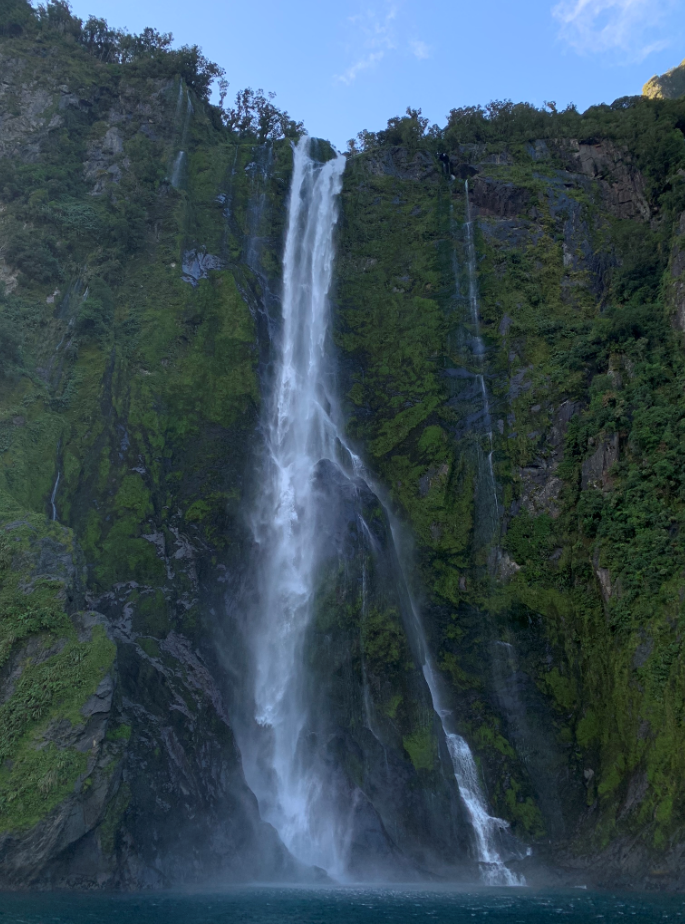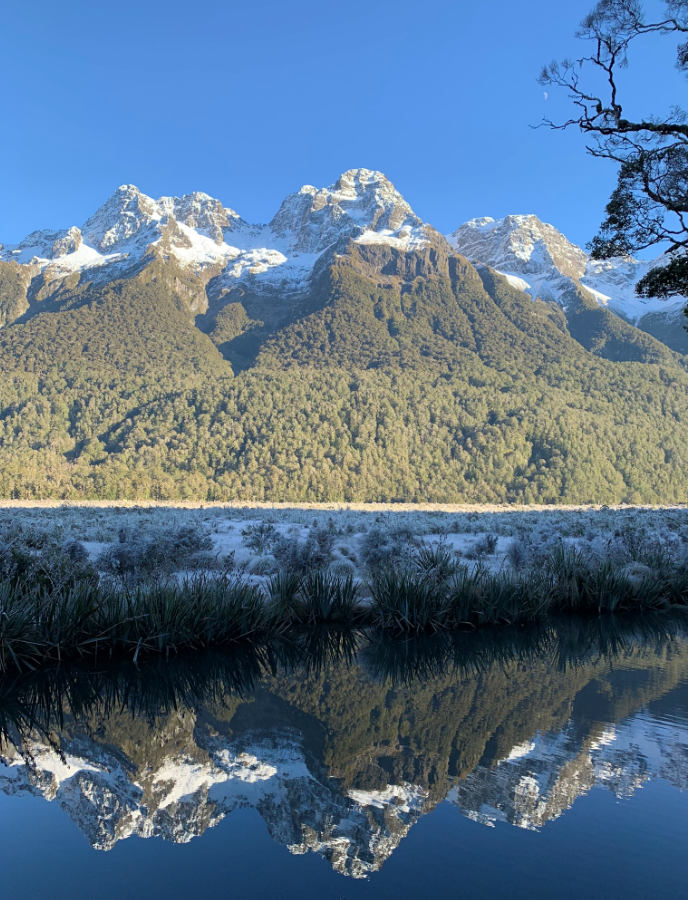Milford Sound: Paua Are Back! | El repunte de los Paua
English
An early start from Queenstown was needed to get us to Milford Sound in good time for our boat tour. Our guide was very knowledgeable and nice. We shared the van with two young women, one from the US, the other from the Netherlands. We did not talk much during the three hours till we arrived at the Sound, mainly because we were sleepy. Again, our weather was extraordinary, and the cruise unforgettable. Besides the stunning scenery, with waterfalls and the bluest of waters, we were fortunate to be able to learn from a Māori tour guide who told us a heartwarming story of environmental restoration. He also taught us about Pounamu – the greenstone jade that is sacred to his people. In the way of his people, pounamu is not purchased, but gifted, and he showed us a piece that his grandfather had given to him in recognition of the restoration work they are doing in the Sound. He let us touch it to feel how smooth and comforting it was. He shared how he and his brother were divers, the kind of people who can slow down their heartrate to dive for longer times by holding their breath. They started to dive at the mouth of Milford Sound to get paua (a type of endemic abalone) and “transplant” them further into the Sound, where they have been over harvested. The missing paua had resulted in an imbalance in the Sound because, without them, algae and other marine plants that are paua’s food sources had overgrown. Bringing the paua back into the Sound, one beautiful big shellfish at a time, has had tremendous positive impact, restoring balance in the Sound. At last count, there were 7000 paua in the Sound. Why are the paua still available in the open ocean? Because Great White Shark roam there. These young men are brave, bold, and fearless, since they harvest paua where the sharks roam. This story was powerful and positive. I thanked the young man and suggested he apply to the Fulbright Commission in Wellington to see if he could travel to the U.S. to share his story.
Español
Necesitábamos salir temprano de Queenstown para llegar a tiempo a Milford Sound para nuestro recorrido en bote. Nuestro guía fue muy eficiente y agradable. Compartimos la furgoneta con dos mujeres jóvenes, una de los Estados Unidos y la otra de los Países Bajos. No hablamos mucho durante las tres horas hasta que llegamos a Milford Sound, principalmente porque teníamos sueño. Nuevamente, nuestro clima fue extraordinario y el crucero inolvidable por un paisaje de fiordos fuera de serie. Además del impresionante paisaje, con cascadas y aguas bien azules, tuvimos la suerte de poder aprender de un guía turístico maorí que nos contó una conmovedora historia de restauración ambiental. También nos enseñó sobre pounamu, el jade de piedra verde que es sagrado para su pueblo. En lo que respecta a su gente, pounamu no se compra, sino que se regala o hereda, y nos mostró una pieza que su abuelo le había dado en reconocimiento a los trabajos de restauración que están haciendo en Milford Sound. Nos dejó tocarlo para sentir lo suave y reconfortante que era. Nos contó que él y su hermano eran buzos sin equipo, el tipo de personas que pueden reducir su ritmo cardíaco para bucear por más tiempo conteniendo la respiración. Comenzaron a sumergirse en la desembocadura de Milford Sound para obtener paua (un tipo de abulón endémico) y “trasplantarlos” a la sonda, donde se habían cosechados en exceso. La falta de paua había provocado un desequilibrio en la sonda porque, sin ellos, las algas y otras plantas marinas que son las fuentes de alimento del paua habían crecido desequilibradamente. Traer el paua nuevamente a la sonda, un hermoso marisco grande, ha tenido un tremendo impacto positivo, restaurando el equilibrio ambiental en la sonda. En el último recuento de estos muchachos, había 7000 pauas en la sonda. ¿Por qué el paua todavía está disponible en mar abierto? Porque el gran tiburón blanco deambula por allí y los buzos no se animan a recolectar pauas en su ámbito. Estos jóvenes son valientes, audaces e intrépidos, ya que cosechan pauas en las aguas donde habitan los grandes tiburones. Esta historia fue poderosa y positiva. Le agradecí al joven y le sugerí que solicitara a la Comisión Fulbright en Wellington para ver si podía viajar a los Estados Unidos para compartir su historia.
Paua Shell | Concha de paua








